Best of Neuromarketing – 2012
It’s time for the annual ritual of picking the top Neuromarketing posts of 2012. As in the past, the list is based on reader traffic – the posts listed had the most views, tweets, likes, etc. I’m a strong believer in crowdsourcing, so what better way to determine the best posts of 2012? Here are the dozen that came out on top:
Six Characteristics of Highly Persuasive Stories
 One of the toughest persuasion tasks is convincing a jury in a courtroom. Car salespeople have it easy by comparison – they control the environment and have the undivided attention of the customer. Imagine if you were in a Lexus showroom listening to why you should buy one of their vehicles, and at your elbow was a BMW salesperson, periodically objecting to the Lexus pitch and then delivering her own. That’s the situation in a courtroom – arguments presented by one side will be directly (and mercilessly) attacked by the other side. One trial-proven persuasion strategy is the use of stories. Read more…
One of the toughest persuasion tasks is convincing a jury in a courtroom. Car salespeople have it easy by comparison – they control the environment and have the undivided attention of the customer. Imagine if you were in a Lexus showroom listening to why you should buy one of their vehicles, and at your elbow was a BMW salesperson, periodically objecting to the Lexus pitch and then delivering her own. That’s the situation in a courtroom – arguments presented by one side will be directly (and mercilessly) attacked by the other side. One trial-proven persuasion strategy is the use of stories. Read more…
How to Write Taglines That Double Sales
 Taglines for products and brands are everywhere, but often they don’t get the attention they deserve. A variety of research shows that one phrase slogans can have a profound effect on how customers see the product. One key factor in crafting that phrase is matching its content to the customer’s mindset, and in particular to two important consumer motivations: prevention and promotion. Read more…
Taglines for products and brands are everywhere, but often they don’t get the attention they deserve. A variety of research shows that one phrase slogans can have a profound effect on how customers see the product. One key factor in crafting that phrase is matching its content to the customer’s mindset, and in particular to two important consumer motivations: prevention and promotion. Read more…
Harvard Lesson: Verbs Beat Adjectives
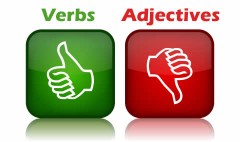 The debate among copywriters about verbs vs. adjectives rages on. While the general consensus is that verbs make better sales copy and adjectives serve mainly to slow down the reader, there’s also research that shows properly used adjectives can increase product appeal. Read more…
The debate among copywriters about verbs vs. adjectives rages on. While the general consensus is that verbs make better sales copy and adjectives serve mainly to slow down the reader, there’s also research that shows properly used adjectives can increase product appeal. Read more…
An Easy Way to Make Your Prices Seem Lower
 Does the way you write a price make it seem higher or lower? Of course! We already know that including a currency symbol can have a negative effect – that’s why you see some restaurants pricing a steak at “29” instead of “$29” (see Neuro-Menus and Restaurant Psychology). But new research shows that punctuation and decimals can make a difference in how people perceive prices. Read more…
Does the way you write a price make it seem higher or lower? Of course! We already know that including a currency symbol can have a negative effect – that’s why you see some restaurants pricing a steak at “29” instead of “$29” (see Neuro-Menus and Restaurant Psychology). But new research shows that punctuation and decimals can make a difference in how people perceive prices. Read more…
Starbucks Loyalty Fail
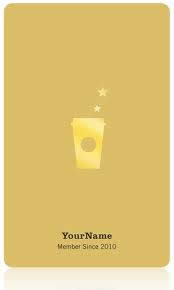 Starbucks knows a thing or two about loyalty. I’m a Gold Card member, and enjoy the free refills as well as the periodic free drinks I accrue by using it… Many other coffee shops offer complimentary in-store refills to all customers, but Starbucks has converted refills into a loyalty benefit. (Similarly, Starbucks has put their own spin on the ubiquitous “free wi-fi” offered at most establishments. They created their own portal with special content like free access to pay sites like WSJ.com and NYTimes.com.)
Starbucks knows a thing or two about loyalty. I’m a Gold Card member, and enjoy the free refills as well as the periodic free drinks I accrue by using it… Many other coffee shops offer complimentary in-store refills to all customers, but Starbucks has converted refills into a loyalty benefit. (Similarly, Starbucks has put their own spin on the ubiquitous “free wi-fi” offered at most establishments. They created their own portal with special content like free access to pay sites like WSJ.com and NYTimes.com.)
So, I was surprised when normally savvy Starbucks sent a friend this message: Read more…
The Psychology of Beer
 The US football season began this weekend, replete with tailgates, watch parties, and plenty of beer consumption. It’s timely that new research has been released showing that the shape of the glass has a huge effect on how quickly we consume beer. Researchers at the University of Bristol in the UK gave subjects a glass of beer. The subjects, who didn’t realize their consumption was being carefully monitored, watched a short documentary film and answered a few questions. Read more…
The US football season began this weekend, replete with tailgates, watch parties, and plenty of beer consumption. It’s timely that new research has been released showing that the shape of the glass has a huge effect on how quickly we consume beer. Researchers at the University of Bristol in the UK gave subjects a glass of beer. The subjects, who didn’t realize their consumption was being carefully monitored, watched a short documentary film and answered a few questions. Read more…
How to Turn a NO into a YES!
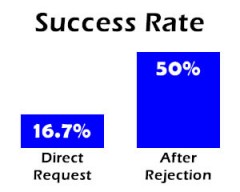 Can an initial rejection actually help you get the “yes” you really want? Surprisingly, if you create the right first and second requests, it can. Persuasion expert Robert Cialdini conducted a classic experiment that demonstrates the technique by soliciting volunteers to work with troubled kids. When college students were asked to volunteer to spend two hours accompanying boys and girls from a juvenile detention facility on a trip to the zoo, less than one in five – a mere 16.7% – agreed to participate. Then, one change was made to the solicitation, and the positive responses jumped to 50%.Read more…
Can an initial rejection actually help you get the “yes” you really want? Surprisingly, if you create the right first and second requests, it can. Persuasion expert Robert Cialdini conducted a classic experiment that demonstrates the technique by soliciting volunteers to work with troubled kids. When college students were asked to volunteer to spend two hours accompanying boys and girls from a juvenile detention facility on a trip to the zoo, less than one in five – a mere 16.7% – agreed to participate. Then, one change was made to the solicitation, and the positive responses jumped to 50%.Read more…
Persuade with Silky Smooth Copy
 It shouldn’t surprise Neuromarketing readers that choice of words is important when writing headlines, taglines, or copy, but brain scans show how specific words can have the same meaning but activate different areas of the brain. Emory University researcher Krish Sathian has shown that words that words related to texture, for example, activate areas of the brain associated with touch – even when their usage has nothing to do with tactile sensations. Read more…
It shouldn’t surprise Neuromarketing readers that choice of words is important when writing headlines, taglines, or copy, but brain scans show how specific words can have the same meaning but activate different areas of the brain. Emory University researcher Krish Sathian has shown that words that words related to texture, for example, activate areas of the brain associated with touch – even when their usage has nothing to do with tactile sensations. Read more…
Love/Hate: Why Disliked Brands Prosper
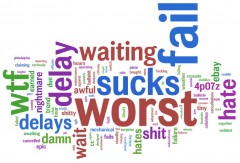 Something brand owners strive for is that elusive magic of being loved by consumers. Brands like Apple, Google, Southwest Airlines, and others have earned enduring positive regard among consumers, and those companies outdo their peers in part because of the brand equity they have built. But what about brands people don’t like? Oddly, some of those survive quite nicely and even prosper. Read more…
Something brand owners strive for is that elusive magic of being loved by consumers. Brands like Apple, Google, Southwest Airlines, and others have earned enduring positive regard among consumers, and those companies outdo their peers in part because of the brand equity they have built. But what about brands people don’t like? Oddly, some of those survive quite nicely and even prosper. Read more…
Persuade With Pictures
 A picture may be worth MORE than a thousand words in some cases. A new study shows that text is more credible when accompanied by photos, even when the photos don’t support the point of the text!
A picture may be worth MORE than a thousand words in some cases. A new study shows that text is more credible when accompanied by photos, even when the photos don’t support the point of the text!
Researchers at the Victoria University of Wellington in New Zealand showed that statements about a celebrity being alive or dead were judged to be accurate more often when they were accompanied by photos of that celebrity. Read more…
What Pricing Strategy Beats Discounts?
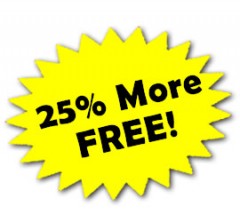 If you want to sell more product by running a sale, which would make more sense: advertising “price cut 33%” or “50% more” product? Functionally, the two are the same level of discounting. Researchers at the University of Minnesota found, though, that a “50% bonus pack” sold 71% more than a “35% discount,” even though the latter is a slightly lower price per unit.
If you want to sell more product by running a sale, which would make more sense: advertising “price cut 33%” or “50% more” product? Functionally, the two are the same level of discounting. Researchers at the University of Minnesota found, though, that a “50% bonus pack” sold 71% more than a “35% discount,” even though the latter is a slightly lower price per unit.
As Barbie famously said, “Math is hard.” Both male and female brains aren’t good at automatically determining which deal is best, which explains why a “50%” number looks more attractive than “35%” even when mathematically it is actually worse. Read more…
The Easiest Way Ever to Boost Your Productivity
 Do you find chunks of your day consumed by less than productive activities? Updating Twitter? Checking Facebook? Clicking on those fascinating links posted by your friends? Checking sports scores or stock prices? Catching up on the latest hilarity from DamnYouAutoCorrect? None of these are bad things, but when you have important tasks to complete these non-essential activities can kill your productivity. It turns out there’s a quick visualization you can perform that will make you more likely to focus on your mission-critical tasks.Read more…
Do you find chunks of your day consumed by less than productive activities? Updating Twitter? Checking Facebook? Clicking on those fascinating links posted by your friends? Checking sports scores or stock prices? Catching up on the latest hilarity from DamnYouAutoCorrect? None of these are bad things, but when you have important tasks to complete these non-essential activities can kill your productivity. It turns out there’s a quick visualization you can perform that will make you more likely to focus on your mission-critical tasks.Read more…
Did a post you found useful not make the list? Share it in a comment. And, for those of you close to checking out for 2012, have a great holiday season and fantastic 2013!

I’m so very thankful for your taking the time to summarize your best articles. This is the best sensory stimulation for an online marketer at the end of the year!
Congratulations on all your success and for sharing your tips and insights
Wow, amazing list of articles, this is awesome, thanks Roger. Keep it up in 2013. I’m a loyal reader who just found this blog this year, I love it. Please don’t stop what you’re doing!!
Highly informative summary of articles! In-fact I appreciate and like that instead of marking other top blogs or articles you checked your own great articles which is another good form of engaging readers.
Thanks
Stephen
Thanks, Stephen. I’d have a hard time picking the best posts of all the blogs I read, not to mention the ones with great content that I don’t often see!
I do try to tweet links to good posts when I run across them!
Roger
Yes that’s what I find amazing! Great!
Thanks
Such a great retrospective summery! Really great articles, and although I’m a little bit late, let me wish you a merry post-xmas and a very happy new year!